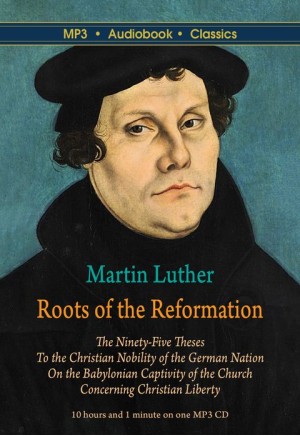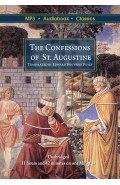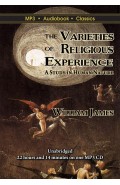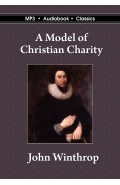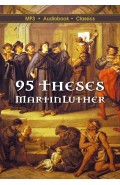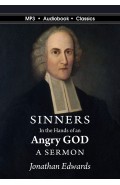| Track | Track Title | Composers | Length |
| The Ninety-Five Theses | |||
| 1 | 1-1 - The Ninety-five Theses | David Jaquay | 17:32 |
| To the Christian Nobility of the German Nation | |||
| 2 | 2-0 - Dedicatory Letter & Introduction | Jonathan Lange | 7:13 |
| 3 | 2-1 - I: The Three Walls of the Romanists | Jonathan Lange | 27:00 |
| 4 | 2-2 - II: Of the Matters to be Considered in the Councils | Jonathan Lange | 31:56 |
| 5 | 2-3 - III: 27 Articles respecting the Reformation: 1-12 | Jonathan Lange | 29:56 |
| 6 | 2-4 - III: 27 Articles respecting the Reformation: 13-19 | Jonathan Lange | 27:24 |
| 7 | 2-5 - III: 27 Articles respecting the Reformation: 22--24 | Jonathan Lange | 31:05 |
| 8 | 2-6 - III: 27 Articles respecting the Reformation: 25-27 | Jonathan Lange | 37:15 |
| On The Babylonian Captivity of the Church | |||
| 9 | 3-0 - Introductory Letter to Hermann Tulichius | Jonathan Lange | 19:12 |
| 10 | 3-1 - Concerning the Lord's Supper - A | Jonathan Lange | 35:25 |
| 11 | 3-2 - Concerning the Lord's Supper - B | Jonathan Lange | 54:44 |
| 12 | 3-3 - Concerning the Sacrament of Baptism | Jonathan Lange | 1:01:52 |
| 13 | 3-4 - Concerning the Sacrament of Penance | Jonathan Lange | 24:19 |
| 14 | 3-5 - Of Confirmation and Of Matrimony | Jonathan Lange | 35:02 |
| 15 | 3-6 - Of Orders | Jonathan Lange | 24:44 |
| 16 | 3-7 - Of Extreme Unction | Jonathan Lange | 21:25 |
| Concerning Christian Liberty | |||
| 17 | 4-1 - Letter of Martin Luther to Pope Leo X | Jonathan Lange | 22:44 |
| 18 | 4-2 - The Freedom of Faith | Jonathan Lange | 39:41 |
| 19 | 4-3 - The Bond of Love | Jonathan Lange | 37:32 |
| 20 | 4-4 - Conclusion | Jonathan Lange | 14:43 |
Artwork
Cover: Portrait of Martin Luther, 1528, by Lucas Cranach the Elder.
Inset: Same as cover.
Insert: Martin Luther, Bust in Three-Quarter View by Lucas Cranach the Elder.
| Title: | The Ninety-Five Theses | To the Christian Nobility of the German Nation | On the Babylonian Captivity of the Church | Concerning Christian Liberty |
| Read by: | David Jaquay | Jonathan Lange | Jonathan Lange | Jonathan Lange |
| Length: | 17:32 | 3:11:56 | 4:36:54 | 1:54:57 |
| Book Coordinator: | J. M. Smallheer | Jonathan Lange | Jonathan Lange | Jonathan Lange |
| Meta Coordinator: | J. M. Smallheer | Karen Savage | TriciaG | Barry Eads |
| Proof Listener: | Carl Manchester | Kajo | Kajo | DaveC |
The works in this book are available on eBook at Gutenberg.org:
· The Ninety-Five Theses or ‘Disputation of Doctor Martin Luther on the Power and Efficacy of Indulgences’· Concerning Christian Liberty; with Letter of Martin Luther to Pope Leo X. by Martin Luther
· Works of Martin Luther, with Introductions and Notes (Volume I) by Martin Luther
· Works of Martin Luther, with Introductions and Notes (Volume II) by Martin Luther
This book collects four key works authored by Martin Luther that form the framework of the Reformation and the theological underpinnings of Protestantism.
The Ninety-five Theses, also titled Disputation on the Power of Indulgences, is a list of propositions intended for academic debate that created a division in the Catholic Church that became the Reformation. It objected to the practice of the church selling indulgences, with which buyers could reduce the punishment in purgatory for sins. Luther argued that indulgences led to Christians to avoid the inner spiritual repentance required by Christ.Legend has it that the list was posted on the door of the All Saints’ Church in Wittenberg on October 31, 1517.
To the Christian Nobility of the German Nation is the first of three foundational works written by Martin Luther in 1520. He sets forth the radical doctrines of the priesthood of all believers, that all baptized Christians are “priests” and “spiritual” in the eyes of God, as opposed to the traditional division of the Church into “spiritual” officers of and “secular”followers. He also articulates the doctrine of two kingdoms of God, the left-hand secular, physical world of things and action, and the right-hand world of the spirit, gospel and grace. Both were radical breaks that directly challenged the “three walls” of church doctrine: that secular authority had no jurisdiction over the church; that only the Pope could explain Scripture; and that nobody but the Pope was empowered to call a church council.
On the Babylonian Captivity of the Church, the second of Luther’s 1520 works, is a theological treatise in which he examined the seven sacraments of the Church in the context of his reading of the Bible. Angry and harsh in tone, Luther criticizes the Pope of being the Antichrist. He limits the true “divinely instituted” sacraments to Baptism, Eucharist, and Penance,deeming Confirmation, Matrimony, Holy Orders and Extreme Unction.
On Christian Liberty is the third of Luther’s 1520 works and appeared in a short German version and a more elaborate Latin version. In it he elaborates the notion of justification by faith alone and the seeming paradox of Christians as fully forgiven children of God who nevertheless willingly serve God and their neighbors, encapsulated by his famous statement. "A Christian is a perfectly free lord of all, subject to none. A Christian is a perfectly dutiful servant of all, subject to all."
Play sample:
Download a PDF datasheet
| Item Info | |
| EAN - DVD case | 0701236969603 |
| EAN - CD jacket | 0686175923216 |
| Media | MP3 CD |
| Package | DVD Case |
| Author | Martin Luther |
| Year | The Ninety-five Theses - 1517; To the Christian Nobility of the German Nation -1520; On the Babylonian Captivity of the Church - 1520; On Christian Liberty - 1520 |
| Recording | |
| Read by | Multiple readers |
| Length | 10 hours and 1 minute |
| Type of Reading | Collaborative |
Martin Luther: Roots of the Reformation
- Author: Martin Luther
- Product Code: DB-1240
- Availability: In Stock
-
$9.99
Available Options
Related Products
The Confessions of St. Augustine
The Confessions of St. Augustine, also called Confessions, is an autobiographical work written by St..
$11.99
The Varieties of Religious Experience
The Varieties of Religious Experience: A Study in Human Nature by William James is an edited collect..
$13.99
A Model of Christian Charity
Political commentators often refer to an image of a shining “city on a hill” as a metapho..
$7.99
The Ninety-five Theses
The practice of issuing public decrees to establish the doctrines of the Catholic Church date..
$7.99
Sinners in the Hands of an Angry God
"Sinners in the Hands of an Angry God" is a sermon written by the noted Colonial American ..
$7.99

